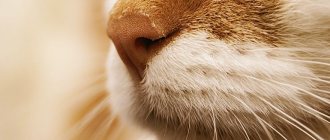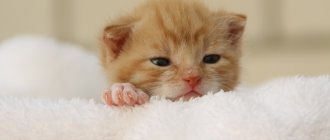Kissing is widely known in the human community as a means of affection and love, so when you try to kiss your cat, you naturally think that she will appreciate it. But when she pulls away from your affectionate kisses, it may seem like she's rejecting you. What do cats think when we kiss them, and why do they move away from the kiss?
It's still unclear what cats think when we kiss them, but it's clear that they express affection differently than humans. They may not understand what kissing means and may be confused by your actions. Because kissing imitates tilting the head back, cats sometimes lean toward them.
Your cat loves you and appreciates your attention, but if you're wondering why she doesn't like your kisses, read on. What you learn may surprise you, or it may not.
Why you can't kiss cats: reasons for the ban
Doctors, veterinarians, and animal husbandry and breeding experts are unanimous in their opinion that cats should not be kissed. But what is the reason for this ban? Basically, the argument is made that through kissing a pet (and especially a stray one) you can get an unpleasant disease. But even if the animal is 100% clean of any microbes, fungi and worms, you still shouldn’t touch it with your lips: cats are uncomfortable with such a human act of showing love and they can easily “go on the attack”, trying to protect themselves.
What do cats think when people kiss them?
How do cats kiss each other? Obviously, completely different from you and me. And animals put a completely different meaning into their “cat caresses.” If the cat wants to express his approval, he can do one of the following actions:
- Blinks both eyes (this is a sign of cat consent).
- It will rub its muzzle and the base of its tail (this is how a cat leaves pheromones on an object that it considers its own).
- He will begin to lick, bite lightly, press with his paws, periodically releasing his claws (these are also all ways to leave his “marks”).
Well-mannered cats will tolerate kisses from their owners, but arrogant animals may bite or scratch
Human kisses are not considered affectionate in the eyes of cats. Just imagine how we look from the animal’s perspective: a large head rapidly reaching towards the cat, for some reason pressing its lips into its muzzle and making a hissing and smacking sound. An animal that lives for a long time surrounded by people will eventually understand that such an action does not threaten it (although it does cause discomfort). Most likely, the pet will tolerate such a manifestation of love, and especially cunning cats will even use it for their own purposes (if they understand that afterward they will receive the owner’s favor or a treat). But out of ignorance or because of its fearful and distrustful disposition, a cat can see human kisses as a threat, which means it can begin to defend itself.
During a fight, animals not only hiss and scream gutturally, but also smack their lips, which is very similar to the sound made by people when kissing - that’s why our “smacks” for cats are tantamount to an offensive curse
Cats, even among themselves, try not to overdo it with affection. Excessive attention overstrains animals. They can still tolerate a person’s advances for a couple of seconds, but from an excessive number of hugs and kisses they will try to run away - they will begin to hide, shy away from outstretched hands and even scratch and bite, showing that they do not want to be touched.
A light touch of a cat’s nose can be called a kind of kiss, since the animal does this only in relation to “its own”, but the meaning of this gesture is to check what the person smells like - whether he ate something tasty and whether he needs it mark with your pheramones
My cat has it written right on her face when I kiss her: “Okay, I understand, you need this, you can’t live without it, without these kisses. For now, I hang for a little without moving and with my eyes closed.” And she hangs, endures, waits for the end of my manifestations of love)) But she herself occasionally comes to kiss, most often this happens at 5 in the morning, when she has already slept and it would be nice to eat.
Natalia
https://thequestion.ru/questions/2839/kogda-kotikov-celuyut-oni-ponimayut-chto-eto-proyavlenie-nezhnosti-ili-prosto-terpyat
Video: cats don't like human kisses
So you can or can't kiss your cat
Do the pets themselves like such tenderness? Alas, most often not. At the very least, you will get a cool and indifferent reaction. The animal simply does not understand this manifestation of the human language of love. And many even see aggression in this, try to dodge, worry, or attack in response, releasing their claws and hissing.
Innocent kisses become a source of stress for the cat. If you want to please a cat, from her point of view, it is better to choose other methods. Treat him with your favorite treat, scratch him behind the ear, stroke him, or even better, play with your pet who missed you during your absence.
Choose the right time for tenderness. If the pet is hungry or in a hurry about its cat business, it is unlikely that it will be delighted. But a well-fed and sleepy cat will accept your signs of attention with great pleasure and reward you with a grateful purr.
In a word, there is no clear answer to the question - is it possible to kiss your cat? Of course, no one can put a categorical ban on you; this is the business of each individual owner and a matter of his love of love. But it’s better to choose other methods of tactile contact that will be pleasant for both you and your pet. Love your pets and let this love be mutual.
Why you shouldn't kiss cats
There are no absolutely clean cats, even those that live only at home and don’t stick their noses outside. The fact is that they walk with their paws, sit and lie on the floor, where there may be dirt brought in by a person on shoes and clothes. Then the pets lick themselves with their tongues (including under the tail), which means their mouths and faces are a potential source of infections. In addition, cats can easily feast on flies that have flown into the house, look into the trash can or drink water from the toilet - the owners simply may not even know about such tricks of their pet.
Having learned what cats do when left unattended, many owners will immediately give up the habit of kissing their faces.
Cat aggression
Pets bring a lot of pleasant emotions into our lives. Well, how can you not love these charming faces, ears, noses? Naturally, we want to somehow express our love and affection, to cuddle and kiss our pet. Sometimes we even treat pets like children. But if a child finds kisses pleasant, then with cats it’s not so simple.
Most cats do not like this kind of tenderness at all. Moreover, they may perceive our innocent, loving kiss as an insult. Why is this happening?
Why cats don't like our kisses
What's wrong with human tenderness? After all, we often observe how cats sniff and lick each other or poke their noses in a person’s face. But the tailed ones do this not at all out of manifestations of love.
These actions help cats understand what we smell like and what tasty things we ate without sharing with them. They also check whether the owner has lost his usual smell. What if a person brought the smell of someone else's cat into the house? Pets don't like this.
© Freepik
When a person wants to kiss a cat, he brings his large (by cat's standards) face closer to the fluffy face. This already stresses and frightens the pet. If you also smack your lips at the same time, you can get bitten on the nose or hit with a paw and walk around with a scratched face.
The fact is that in the cat world, males make sounds similar to smacking when they sort things out. The tailed one perceives this as an insult addressed to him. Take a closer look at a fight between street cats and you can hear that their quarrel is limited not only to hissing and bizarre screams.
© Freepik
05.05.2019
“Do you know what is the most wonderful thing about our animals? This is their ability to put up with our most strange and unacceptable behavior among their relatives. Animals watch their owners and gradually learn to understand their actions. For the sake of your own peace of mind and for the sake of showing affection to a person you trust.” (Wilma Tigelaar, veterinarian and animal psychologist)
We live in a stressful world, filled with daily bad news on TV, problems in the family and hassle at work, and the ill will of others. We are increasingly withdrawn into ourselves and are ready to fight back at any moment.
Why can't you kiss cats?
When a cat climbs into the arms of its owner and curls up comfortably, purring loudly, it is impossible not to cuddle this miracle, stroke it and kiss it. But veterinarians advise against doing the latter. Not only is this unpleasant, first of all, for the cat itself, but it also threatens the owner with various diseases. Especially if your pet does not live at home all the time, but goes for walks outside.
Why can't you kiss cats?
How do cats say “I love you”?
As mentioned earlier, cats have their own characteristics. This means their version of kissing and hugging will also be special for them. Some will bite you as a sign of aggression, while others may do it in a way that makes them think of you as family. Lick, smell, purr and play, everything in general is intimate, that loves and trusts you. Licking is perhaps the closest thing to a human kiss. They probably love you like family, licking you to get ready and show you that you're close.
When cats approach you, you will often rub your head or even scratch your claws in your pants. This is a sign of love, but there is another interesting aspect. Cats have glands on their face and legs that secrete pheromones. When they rub against you in this way, they mark and point out other cats and animals they own...
Cats will also use their tail to show you how they feel about a situation. If they have a tail and are moving slightly, this usually indicates that they are receptive to your affection. If they straighten their ears, whistle, or fight to escape, then you need to back off and give them space.
Why you can't kiss cats and kittens
Among superstitious people who believe in mysticism, there is a widespread view that cats should not be kissed for the reason that this drains a person’s vital energy, which cannot always be fully replenished. However, the seriousness of the situation does not lie at all in some subtle matters. If something unwanted passes to the owner when it comes into contact with fur or saliva on the cat’s face, then these are cat microorganisms, not all of which are harmless. The point is not that not all cats are highly clean, unlike most representatives of their kind. Wool itself is an excellent “nursery” for various kinds of microorganisms, which means that when kissing, contact with them is inevitable.
Cat fur contains microorganisms, not all of which are harmless.
Mystical reasons
At different times and among different peoples, the attitude towards our pets was completely different: from fierce hatred to complete adoration. But all religions and beliefs recognized that the cat is a link between our world and the other world. This is where various signs associated with the danger of kissing a pet arose.
- It is believed that after kissing a cat on the face, a person stops loving everything around him except the cat. He forgets about past attachments and is ready to do the most reckless things for the sake of his deity. This behavior ultimately leads to complete loneliness.
- It is strictly forbidden to kiss cats. Their independent nature cannot come to terms with such an act, and the animal begins to take revenge for the violation of personal space, ruining clothes and shoes, disturbing sleep and organizing other minor, but very annoying troubles. Experiencing constant irritation, a person eventually plunges into deep depression, from which there is often a very sad way out.
- Another belief says that when you kiss a cat, you give the animal all your vitality. After such contact, there is no longer any energy left to overcome life’s difficulties and fight illnesses.
Is it possible to kiss domestic cats?
There is only one conclusion: kisses and close hugs are undesirable for either the pet or the cat’s owners.
Another source of concern is fleas, which can bite and even carry some diseases. Yes, if the cat is an indoor cat and does not go outside, then it most likely does not have insects (although the animal’s “homebody” does not give a 100% guarantee). But in addition to fleas, dust mites live in animal fur, invisible to the eye and causing severe allergies in many people. This is the very notorious “cat allergy”, which, according to the latest scientific research, does not exist. Or rather, it exists, but the cat has nothing to do with it, it’s not the animal at all, but the dust mites. Therefore, those prone to allergies should refrain not only from kissing, but even from bringing animal fur close to their face - this applies to those who like to tinker and sleep with cats as if they were soft toys.
Life cycle of a cat flea
Another source of trouble is cat saliva. Even with absolute confidence that the pet has been treated for parasites. The saliva of mammals contains a certain set of proteins characteristic of each species. When you kiss on the face, some amount of saliva necessarily enters the person’s oral cavity. And here questions may arise: where did the inflammatory processes come from, since the cat doesn’t go for walks, its owners regularly take it to the veterinarian to get rid of parasites? The fact is that the human immune system clearly perceives a foreign protein as hostile and immediately tries to neutralize it. As a result, immunity decreases for some time, but the risk of infection with all sorts of unpleasant ailments increases, the most harmless of which are gingivitis and stomatitis. This is why you can’t even kiss your pet pussies on the faces.
It is also better to simply stroke the sides and back, without kissing - the fur contains microorganisms that are “native” to the cat, but are completely alien to people and the immune system begins to reject them.
Video - Reasons why you shouldn't kiss cats
Why do dogs kiss people?
Showing affection to a dog does not mean kissing or hugging. This is a purely human judgment. The concept of tenderness does not exist for dogs. An animal can make itself comfortable next to you and let itself be kissed, but it does not experience the emotions that a person receives during the same actions.
What is noteworthy is that the pet can lick its face when the owner tries to kiss her. But for an animal, licking pack members is a measure of hygiene. Thus, the animal is simply trying to show care.
A real manifestation of a kind of care and sincere affection is to give a paw to its owner. This action means much more emotionally for a dog than kissing.
In addition, it is important to remember that a dog can show its true feelings in an atmosphere filled with calm, where the animal feels completely safe.
In studies conducted by American scientists on wolf packs, coyotes and foxes, it became known that puppies begin to lick the face of their mother, who has just returned from hunting, demanding food. Domestic dogs lick the faces of their owners because they like the taste. After all, dogs have developed not only a sense of smell, but also taste buds. Animals perfectly distinguish between salty, bitter and sour.
What can you get infected by kissing cats?
So, it's clear that a kiss is not the best way to express your love for your furry pet. Among the “surprises” may await:
- Protozoa bacteria (they do not pose a danger to a person with a strong immune system).
- Staphylococcus (some types pose a threat to humans).
- Salmonella (very rarely cats act as carriers).
- Toxoplasmosis (the pathogen hides in the animal’s feces and, when released into the external environment, becomes passive and develops only under favorable conditions. The risk of getting sick is low if you wash your hands after cleaning trays, but it is better for pregnant women not to do this).
- Fungal infections, for example, ringworm (not dangerous to human life, but it will take a long and unpleasant time to fight).
- Helminths (tapeworms, nematodes, echinococci, roundworms).
The process of infecting a cat with worms
If a four-legged family member walks on the street, then this is even more dangerous - he catches birds and rodents, carriers of various kinds of viruses, including those dangerous to people.
Common diseases
Here are some of the most common diseases that can pass from cats to humans. Agree, this is a pretty good reason why you shouldn’t kiss cats.
- Toxoplasmosis. This disease affects the liver, spleen, eyes, nervous system, heart and other organs. It is especially dangerous for girls “in an interesting position.” Toxoplasmosis can cause irreversible intrauterine damage to the fetus and affect its development.
- "Scratchies." This disease is quite common, although it is not very common to talk about it. The scratched areas can become very inflamed. A rash may appear, an allergic reaction, intoxication, and inflammation of the lymph nodes may occur.
- Worms. The disease is caused by parasites that live in the bodies of cats and humans. It's very easy to get infected. Don’t think that if your pet doesn’t go outside, then it’s “clean.” If a cat eats raw meat or fish, then it definitely has worms.
- Rabies. A fairly well-known disease that can be fatal. It is transmitted by bites along with the saliva of a sick animal. Of course, domestic pussies rarely go wild, but it still happens.
- Plague. This is a very dangerous disease. It is generally accepted that it is carried by rats, but cats can also be sources of infection. In humans, the plague causes severe fever, sepsis and attacks the lungs.
- Felinosis. It manifests itself in humans in the form of a rash, pustular inflammation, fever and other unpleasant symptoms. It is transmitted mainly from cats through mucous membranes and saliva.
- Lichen. A very unpleasant and common disease. Fungal infection causes hair loss, severe itching, sores and redness. It takes quite a long time to heal.
Do cats like to be kissed?
A logical question arises: how does the cat herself feel from hugs and kisses from her owner? Surprisingly, very few murks perceive this as affection and would like to receive it again and again. On the contrary, they see this as some kind of act of aggression and try in every possible way to avoid such a manifestation of feelings - they worry, hiss, and sometimes use their claws. It's simple - cats and people are not brothers and their ways of expressing emotions are completely different. If a cat responds to kisses with bites or scratches, this does not mean that it is aggressive or ill-mannered - it means that it has encountered an alien type of communication and does not understand how to behave. Or, on the contrary, she has already understood and clearly makes it clear to the person: “Stop it.”
Kisses imitate the flight of the head
Cats who enjoy kisses may view them as a type of head pat. As mentioned above, this is one of the ways cats show their affection. Because they rub their cheeks against each other to show affection and impart their scents on each other, kissing may be perceived by your cat as you doing the same thing as them.
If you rub your cheek against your cat's cheek and then kiss her on the head, she will likely respond favorably because the cat perceives this as "butting."
Of course, not all head bunting (or head butting) is gentle. Some types of head butting are aggressive and can hurt you or knock points off your face. If your cat is aggressive towards you, she will smell her scent on you to warn other cats to back off.
Cat Kiss: Are you really kissed by your cats and pussies?
Cat owners are well acquainted with such characteristics of their four-legged charges as head-butting on the owner’s arms and legs, rubbing, touching with their paws, and light biting. Many people regard this as actual kissing, so why don’t they kiss the pussy in return?
In fact, such a manifestation of emotions has nothing to do with kissing. If a cat rubs against furniture, objects, bags, clothes, or the owner’s hands, then in no case does it express its submission as some people think and does not kiss. She marks the territory in this way, saying: “This is all mine, and the person is also mine, I allow him to be on my territory.” When a cat rubs, it spreads its scent throughout its habitat and divides those present into friends and foes.
Cats often lick. But this does not mean that they are kissing: the owner probably found the pussy tasty, because the aroma from the food remained on his hand or cheek. The same thing happens if a pet smells a new, unfamiliar scent - for example, the owner bought himself a new perfume. They will definitely come and rub and “tag” you. A cat can also lick a person if he doesn’t seem clean enough to her. The roots of this behavior lie in the instinctive desire of the mother cat to protect her brood from danger and rid it of foreign odors.
What does the cat say?
Important! In the same way, the cat examines pieces of furniture, sniffing them and tasting them with its teeth. However, no one thinks that she is kissing, for example, the sofa. Meanwhile, she studies a person in the same way. This is nothing more than a cognitive process, testing the teeth, studying properties. It has nothing to do with a kiss. Sometimes, by biting, a cat is forced, on the contrary, to stop the flow of affection from the owner. If he doesn’t understand, the cat scratches, bites and hisses. Some attribute this to an aggressive character, although in fact it is not the cat who is the aggressor, but she sees the owner as such.
All this does not mean that cats cannot kiss. They know how and practice. But they do this not through tactile contact, but at a distance. They squint their eyes, look at the owner, purring, sometimes turning on their back and sticking out their belly, demonstrating a high degree of trust in the person. Therefore, if you really want to please a cat (not from a human point of view, but from the point of view of the cat and its preferences), then the best kiss is to look at it gently, then slowly look away.
How cats show their love
What do cats like?
Cats have their own ways of telling you that they love you, but they also have certain ways in which they like to be shown affection . A cat has certain areas that like to be touched more than others. They include on the back, under the chin, behind the ears and on the head. Their bellies and legs are generally off-limits as they are too sensitive.
These cats are very curious and really like to look at things. The way they look at you can be a sign of close affection. However, they do not like looking directly into your eyes; they often perceive this as a sign of threat. In general, they love company and will spend time sitting on your lap or letting you pet them.
If you want to show affection to your cat, you must start by ensuring its well-being. This means providing adequate nutrition, plenty of fresh water and a free environment. When you do this, they will know that they trust you more and will be more likely to allow you to show affection. Whether it's through kissing or hugging depends on your cat.
The benefits of communicating with cats
Scientists have proven that the benefits of communicating with furry pets are undeniable: even the very presence of a cat has a beneficial effect on the owner’s psyche, especially tactile contact when he picks it up and strokes it. In addition to purely moral satisfaction, communication with a pet improves well-being due to:
- activation of blood flow;
- warming the body, which is especially important during inflammatory processes and radiculitis;
- normalization of blood pressure and heart rate through activation of neurons from contact with cat fur.
In addition, it is noted:
- faster and more productive socialization of children with Down syndrome - constant contact with a cat makes it easier to get into contact with society;
- increasing stress resistance;
- quick relaxation after a busy day for all people, this is especially important for those whose work involves stress;
- getting rid of insomnia;
- reduction of symptoms of “chronic fatigue syndrome”, rapid fatigue disappears.
Thus, the benefits of tactile communication with your pet are undeniable. However, it should be remembered that it is impossible to force a cat to sit with its owner and treat him. The cat will leave if at the moment he did not plan to sit with the owner and purr. There will be no benefit from this, even if you forcibly hold the animal on your knees. It is better to wait until the cat is ready to do this.
Positive and negative effects of cats on human health
In a word, you can and should kiss cats, but at a certain distance. This is optimal contact for both four-legged animals and humans. The cat will feel that the owner loves her and respects her personal space, and the person does not need to be afraid of contracting unpleasant microorganisms or infections.
Attention! A cat and a person belong to different species, which means they have different languages and preferences, and you should not try to force animals to love you by forcibly hugging and kissing them.
You can watch a video on the dangers of kissing cats here:
Possible diseases
There are a number of diseases that a cat can infect humans by being a carrier.
Toxoplasmosis
This is an extremely dangerous parasitic disease transmitted through Toxoplasma, a protozoan single-celled organism.
Today, more than half the adult population of Europe, South and North America is infected—almost 90%. But humans are an intermediate carrier of the parasite. And the main carrier is all cat species. During the short period of the acute phase of the disease, they release from 2 to 3 billion oocysts. Parasites, along with animal feces, enter the environment and, after spirulation, can live in a preserved state for up to three years, waiting for a new carrier.
Cats usually tolerate the disease easily. And it manifests itself in short-term conjunctivitis and diarrhea. Small kittens with intrauterine infection and young animals, especially with concomitant viral infections, can die from toxoplasmosis.
For humans, a cat with toxoplasmosis is dangerous for a very short period of time during the acute phase of the disease and only if the parasite enters directly into the owner’s blood (for example, through bleeding scratches on the hand when the pet licks them). Or if by chance the cat sneezes in the owner’s face.
This is why you should never kiss an animal. In air, oocysts die immediately, and with direct mouth-to-mouth contact they can enter the human body through saliva.
Infection is especially dangerous for a pregnant woman, since there is a high probability of intrauterine infection of the child.
With daily cleaning of the cat litter, infection is impossible, since spirulation, that is, the readiness of Toxoplasma to enter the host’s body, does not occur immediately. This is possible no earlier than in a day (sometimes up to five).
Cat scratch disease - Felinosis
This disease has been known for a long time, but its mechanism was fully described only in the 90s of the last century.
Benign lymphoreticulosis or Molar granuloma is dangerous due to short-term inflammation of the lymph nodes. The disease is transmitted through scratches from a cat’s claws.
More than half of all cats in the world are carriers of Felinosis. Since the infection has been little studied, there is a possibility that the animal’s saliva may contain its pathogens. For this reason, kissing pets is also dangerous.
Pets themselves become infected with Felinosis through fleas. For this reason, it is important to regularly treat them for external parasites.
In a person, after infection, the disease develops over three stages; with sufficiently good internal reserves of the body, it proceeds easily (often asymptomatic) and recovery occurs on its own. The person who has recovered from the disease develops a strong immunity to Felinosis.
Salmonella
This is a zooanthropotic pathology that equally affects cats and humans. It is transmitted by infection of the body with Salmonella bacteria.
They are capable of surviving for up to 2-3 months on human furniture, clothing, and shoes. About six months - on food and excrement, in water and garbage. The bacterium easily tolerates sunlight and temperature changes. -85 ⁰C and +100 ⁰C are destructive for it. But effective disinfection can help get rid of the parasite within half an hour.
Salmonellosis is extremely difficult for newborn kittens and young animals to suffer from. Diarrhea and other dyspeptic symptoms appear, quickly leading to dehydration of the body.
For humans, this disease is also extremely dangerous and difficult to tolerate.
The cat usually gets sick within a day or three after infection. Therefore, kissing a pet is dangerous, in case it has already eaten infected meat and is currently transmitting the pathogen through saliva to its owner.
If any symptoms of pathology appear in a cat or a person, you should immediately contact a veterinarian and doctor. If treatment is carried out on time, consequences can be avoided.
Worm infestation
This disease is carried by a variety of parasitic worms. Refers to zooanthropotic diseases.
You can become infected through food, dirt, soil, feces, saliva of an infected individual, lice, fleas, and other external parasites.
There are a lot of types of worms, about 30 in Russia alone.
The best way to prevent your pets and household from getting helminthic infestations is timely deworming of your pets. Veterinarians recommend performing this procedure once every three months.
At the first signs of pathology, you must contact a specialist and begin treatment. The prognosis is positive.
When kissing a cat, infection can easily occur through saliva, because there is no guarantee that the animal is not infected.
Fungal infections
Ringworm is the most common zooanthropotic disease today, which is easily transmitted from cats to humans. But most often, on the contrary, the owner infects the pet and, without even knowing it, blames the animal.
The fungus can be brought into the house from the street on clothes and shoes, but a cat can easily pick it up at an exhibition or while walking outside. Dog paws are another source of infection.
Treatment methods for lichen today are effective, although the process will take at least a month for both humans and pets.
Hygiene practices must be followed to avoid infection. Kissing a cat, especially a stranger, is strictly prohibited.
There is currently no effective regular vaccine.
Rabies
This is one of the most dangerous diseases in the world, it is equally dangerous for both people and cats.
Rabies has been well studied and described. The salvation of humanity from this infection was the vaccine developed by Louis Pasteur.
It is recommended to vaccinate pets annually to prevent the possibility of infection. But you shouldn’t kiss your own pets, much less unfamiliar animals. In case of infection, any pets must be destroyed; a person in the initial stage can be saved by vaccination.










